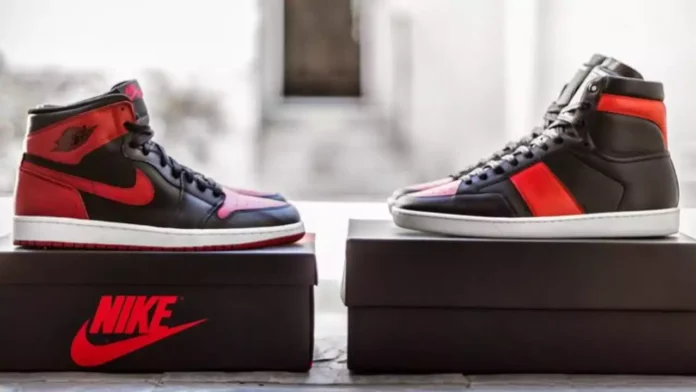In 2024, the number of discounted Nike sneakers doubled compared to two years prior, posing a threat to the sportswear giant’s traditionally robust pricing influence amidst intense competition from competing sneaker brands, as reported by analytics firm Vertical Knowledge.
Examining online pricing information from a selection of eight national chains, including Foot Locker, Dick’s Sporting Goods, and Macy’s, researchers discovered that, on average, these retailers reduced prices on 44% of their Nike sneakers in 2024. This marks a significant increase from the 19.4% observed during the corresponding period in 2022, according to data from Vertical Knowledge.
This shift in trend deviates from the historical pattern, where Nike retailers could consistently sell their Nike inventory at the full retail price, especially for lifestyle shoes like the Nike Air Jordan 1 Retro High. Nike’s complete retail pricing spans from around $50 for basic running shoes to $200 or beyond for exclusive-release Nike sneakers.
Reducing prices on Nike sneakers by certain retailers might pose a challenge for Nike, the global frontrunner in sportswear. “They’re a company that’s been masterful at charging premium prices to the mass market,” said Brian Yacktman, president of YCG Investments, which owns Nike shares.
On Wednesday, a selection of discounted Nike shoes took center stage at a Foot Locker in New York City. Among the offerings were the Lebron 20 basketball sneakers, which saw a price drop from $170 to $129.99. The sale also included various Nike Air Max styles. Meanwhile, at Macy’s flagship store in Herald Square, shoppers could find several discounted Nike Air sneakers, including the sought-after Air VaporMax and Air Huarache models.
Continue Exploring: Nike adapts to shifting market dynamics: Yearly sales outlook revised, shares drop 11%
The average price of Nike sneakers at major retailers like Macy’s decreased to $79.92 in early 2024, compared to $103.61 in the first quarter of 2022, as reported by the data. According to Nike’s most recent annual report, the company engages in wholesale distribution, supplying its products to “thousands of retail accounts.”
According to a Nike spokesperson, the company maintains “a highly diversified wholesale portfolio, with no single partner accounting for a disproportionately large share of total wholesale revenue.” Dick’s Sporting Goods did not provide a comment in response to the inquiry. Foot Locker and Macy’s, on the other hand, opted not to comment. The data indicates that the same eight major retail chains are retailing sneakers from both On Running and Hoka, owned by Deckers, which are emerging as formidable rivals to Nike due to their emphasis on cushioned running shoes. The average price for these sneakers is approximately $148 per pair.
In a recent interview, Yacktman, an investor in Nike, voiced apprehensions about the regularity of discounts. “The thing I’m laser focused on with Nike is when they’re going to quit the promotional pricing and get back down to brass tacks.” His company also holds stocks in Amazon and LVMH.
Two years ago, Nike withdrew from certain wholesale distributors to concentrate on direct-to-consumer sales. However, in June, the company revealed its decision to re-engage with retailers like DSW, owned by Designer Brands, indicating that such chains remain a crucial avenue for Nike to connect with consumers.
In a surprising move in late December, Nike revised down its annual sales forecast for 2024, catching investors off guard. Chief Financial Officer Matthew Friend attributed the adjustment to a “highly promotional marketplace,” especially in the online sector. To address uncertainties in consumer demand, the company also announced an accelerated plan to trim the supply of “key franchises.”
Continue Exploring: Upstart brands gain ground as Nike’s powerhouse labels face setback, analysts warn
Nike has long marketed its shoes as sought-after, premium products. In December, Friend also told investors that Nike anticipates an expansion in gross margins this year, in part because of “strategic” price increases.
However, according to footwear industry analyst Matt Powell, Nike has been saturating the market with bestsellers such as its retro lifestyle sneakers and various versions of its Jordan brand. This involves releasing an excessive number of styles to retailers, despite indications that consumers are becoming fatigued with Nike shoes.
Vertical Knowledge monitored the pricing of eight retailers, revealing that the sale of Nike sneakers at a discounted rate exceeded that of Hoka sneakers (4.5%), Adidas shoes (18.9%), ON Running shoes from Switzerland (23.1%), or Puma styles (37.4%).
Reducing prices could jeopardize Nike’s appeal to consumers. According to Powell, if shoppers observe more frequent discounts on Nike styles, there is a risk of Nike being perceived as just another ordinary shoe brand in their eyes.
Further evidence of diminishing consumer demand is evident in the declining prices of Nike styles, including the Nike Dunk Low Retro, on the sneaker resale market. In 2023, Nike introduced 116 new iterations of the shoe, a significant increase from the 31 released in 2019, as reported by Dylan Dittrich, the head of research at Altan Insights, specializing in the study of the collectible sneaker market.
At the end of 2021, some releases of the shoe sold for up to $340 on resale platforms like StockX—nearly triple Nike’s retail price of $115. However, most Dunk Low styles are now available for close to or less than the original list price.





